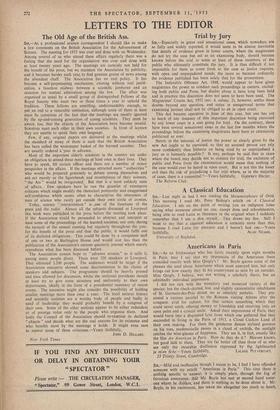LETTERS TO THE EDITOR
The Old Age of the British Ass.
Sra,—As a professional science correspondent I should like to make a few comments on the British Association for the Advancement of Science. The meeting for 1953 was over and done with on Wednesday. Among several of us who attend these affairs regularly there was a feeling that the need for the organisation was over and done with at least twenty years ago. The meetings are certainly not held for the benefit of the press, but we maintain the Association by publicity, and it becomes harder each year, to find genuine grains of news among the abundant chaff. The Association has no real policy. It has become a self-perpetuating mechanism, existing without real justifi- cation, a function midway between a scientific jamboree and an occasion for mutual admiration among the few. The affair was organised as usual by a small group of distinguished Fellows of the Royal Society who meet two or three times .a year to uphold the tradition. These fellows are unwilling, understandably enough, to put an end to a venerable institution, although some of them at least must. be conscious of the fact that the meetings are mostly ignored by the up-and-coming generation of young scientists. They must be aware, too, that the objects of the Association have become invalid. Scientists meet each other in their own societies. In front of laymen they are unable to speak their own language.
Few, if any, original papers are delivered at the meetings whilst the standard of many of them is such that the British Association has been called the wastepaper basket of the learned societies. They are usually ordered a 'year in advance. . Most of the important elderly scientists in the country are under an obligation to attend these meetings at least once in their lives. They h4ve to speak, fill certain offices and there are a number of minor perquisites in the affairs. If the meetings attracted more " authorities " Who would be prepared genuinely to debate among themselves and not act merely as the figureheads and mouthpieces of their sciences, " the Ass " would be invigorated.' But that is a' most unlikely state of affairs. Few speakers have to run the gauntlet of extempore criticism which might modify the rhetorical pomposity and exaggerated self-confidence which seems often to characterise the utterances of men of science who rarely get outside their own circle of cronies.
Today, science " interpretation " is one of the functions of The press and the radio. Almost all the subjects discussed at Liverpool this week were published in the press before the meeting took place. If the Association could be persuaded to abstract and interpret at least some of the proceedings of the learned. societies, not only during the turmoil of the annual meeting but regularly throughout the year, for the' benefit of the press and thus the public, it would fulfil one of its declared obligations. This could be done by a competent staff of one or two at Burlington House and would cost less than the publication of the Association's curious quarterly journal which merely reproduces what has been discussed before.
The Association cannot hope to " advance science," as it calls it, among many people direct. There were 320 speakers at Liverpool. They attracted 3,200 people. The audiences would be larger if the Association executive showed some discrimination in the choice of speakers and subjects. The programme should be heavily pruned and time allowed for discussion, whilst the sectional presidents should at least try to give some structure and uniformity to their own departments, ideally in the form of a presidential summary of recent events. The executive might also consider the possibility of holding smaller meetings more than once a year. The local natural history and scientific societies are a worthy body of people and badly in need of leadership: they would probably benefit by a congress of their own. Some of the other sections appear to be either redundant or of prestige value only to the people who organise them. And lastly the Council of the Association should re-examine its declared "objects " and decide what are the real reasons for its existence and who benefits most by the meetings it holds. It might even care to answer some of these criticisms.—Yours faithfully, New York Times
JOHN D. HILLARY.


































 Previous page
Previous page